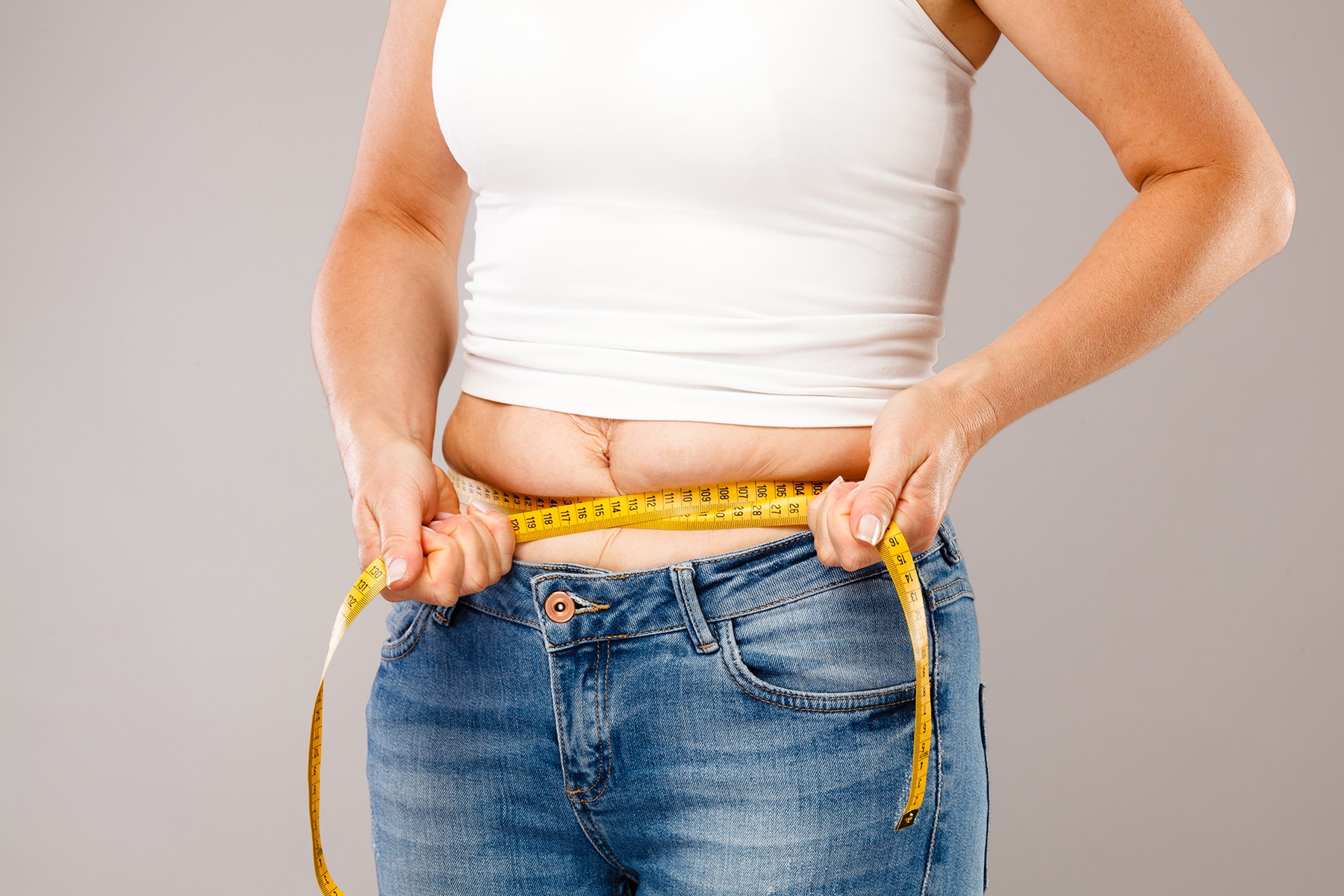Menopause is often linked to weight gain, leaving many women wondering about the relationship between the two. As women age and experience hormonal changes during menopause, they may notice shifts in their body composition and weight. In this post, we will find out the scientific reasons behind why menopause might lead to weight gain, discuss other contributing factors, and provide insights on how to manage and potentially mitigate this common concern among menopausal women.

Contents
Does Menopause Cause Weight Gain?
Menopause itself doesn’t directly cause weight gain, but the hormonal changes and other factors associated with menopause can make it more likely to happen. Here’s a breakdown:
1. Hormonal Fluctuations: Declining estrogen levels during perimenopause and menopause can lead to changes in fat distribution. The body might store more fat around the abdomen (belly fat) rather than the hips and thighs. This shift in fat storage can contribute to a noticeable difference in body shape, even if the overall weight gain is modest.
2. Slower Metabolism: With aging, your basal metabolic rate (BMR) – the number of calories your body burns at rest – naturally decreases. This means you burn fewer calories throughout the day, even without changes in activity level. This can make it easier to gain weight or harder to maintain your weight if you don’t adjust your calorie intake.
3. Lifestyle Factors: Menopause often coincides with other life changes that can influence weight gain. These might include:
- Decreased physical activity: Menopausal women might become less active due to various reasons, leading to a calorie imbalance.
- Changes in diet: Dietary habits might shift towards less healthy choices due to busy schedules, comfort food cravings, or age-related taste changes.
- Stress: Stress levels can rise during menopause due to hormonal changes and life transitions. Stress hormones like cortisol can contribute to weight gain, especially around the belly.
While menopause doesn’t directly cause weight gain, it creates a hormonal and metabolic environment that can make weight management more challenging. However, this doesn’t mean weight gain is inevitable.
When Does Menopause Weight Gain Start?
Menopause weight gain is a common concern for many women, but the exact timing can vary. Here’s a breakdown of what to expect:

-
It often starts during perimenopause: This is the transition period leading up to menopause, which can begin several years (up to 10 years) before your final period. Fluctuations in estrogen levels during this time can contribute to weight gain.
-
Average weight gain is gradual: Most women gain around 2-5 pounds during perimenopause, though some may experience more.
-
Weight gain can continue after menopause: It’s common to see weight gain continue at a rate of about 1.5 pounds per year as women progress through their 50s.
Here’s why weight gain might occur around menopause:
- Shifting hormones: Declining estrogen levels can lead to changes in fat distribution, promoting storage of fat around the abdomen instead of the hips and thighs.
- Slower metabolism: As you age, your body’s metabolic rate naturally slows down, burning fewer calories at rest.
- Lifestyle factors: Reduced physical activity and changes in diet habits can also contribute to weight gain during this time.
What’s The Best Way To Prevent Menopause Weight Gain?
Here are some effective approaches:

1. Nutritional Adjustments
- Eat a Balanced Diet: Focus on a diet rich in fruits, vegetables, whole grains, and lean proteins. These foods can help control calorie intake while providing essential nutrients.
- Monitor Portion Sizes: As metabolism slows, calorie needs might decrease. Paying attention to portion sizes can prevent overeating.
- Limit Sugar and Refined Carbs: Foods high in sugar and refined carbohydrates can lead to spikes in blood sugar and weight gain. Opt for whole foods with low glycemic indices to maintain stable blood sugar levels.
- Increase Fiber Intake: Fiber helps you feel full, which can reduce overall calorie intake and aid in weight loss. Foods high in fiber include legumes, whole grains, fruits, and vegetables.
2. Regular Physical Activity
- Aerobic Exercise: Activities like walking, cycling, and swimming increase calorie burn and are crucial for cardiovascular health.
- Strength Training: Muscle mass typically declines with age, but strength training can help build and maintain muscle, which boosts metabolism. Aim for at least two sessions per week.
- Flexibility and Balance Exercises: Yoga and Pilates can improve flexibility, reduce stress, and maintain muscle tone.
3. Lifestyle Modifications
- Get Sufficient Sleep: Poor sleep can interfere with metabolism and increase appetite. Aim for 7-8 hours per night to support weight management and overall health.
- Manage Stress: High stress can trigger overeating or eating unhealthy foods. Techniques such as mindfulness, meditation, or speaking with a therapist can help manage stress effectively.
4. Health Check-Ups
- Regular Check-Ups: Regular visits to your healthcare provider can help monitor health metrics that influence weight gain, such as blood sugar levels, thyroid function, and other relevant hormones.
- Consider Hormone Therapy: Discuss with your doctor whether hormone replacement therapy (HRT) is a suitable option for you, as it may help manage symptoms and prevent weight gain by stabilizing hormone levels.
5. Stay Hydrated
Drink Water: Drinking water can boost your metabolism and help you feel full, reducing the likelihood of overeating.
6. Support Network
Seek Support: Joining support groups or communities can provide encouragement and tips from those who are going through similar experiences. This can be motivating and reduce feelings of isolation.
Frequently Asked Questions
What is the optimal diet for weight loss during menopause?
The Mediterranean diet, rich in whole foods and adaptable to various tastes, provides long-term health benefits and might mitigate weight gain during menopause. A clinical study (2006) also found that a low-fat diet, high in vegetables, fruits, and grains, could help with menopause weight management.
Why does the abdomen increase in size in older women?
There is a change in body composition with aging, potentially causing an abdominal bulge. For women, a decline in estrogen levels during menopause often initiates body fat accumulation, since fat tissues generate estrogen to maintain balance post-menopause.
What is the average weight increase during menopause?
In the postmenopausal period, total body weight usually augments. Women typically gain around 1 pound yearly during menopause. However, weight gain is not consistent for all, with approximately 20 percent of women gaining 10 or more pounds during this transition.
Why is there sudden weight gain in my abdomen?
Sudden weight gain in the abdomen can result from various factors, including stress, alcohol intake, or certain medications. Health conditions like hypothyroidism or PCOS can also lead to this. While lifestyle modifications and medications could treat many causes, ailments like ascites can pose a serious health risk.
How to prevent weight gain during menopause?
Increasing physical activity, including aerobic exercises and strength training, can help shed extra pounds and maintain a healthy weight. Reducing food intake, curbing sweet cravings, limiting alcohol consumption, along with seeking support, can also contribute to preventing weight gain during menopause.
I am a medical student with experience and interest in Women’s health and well-being.